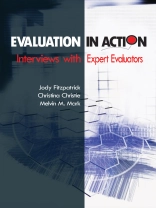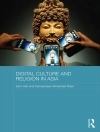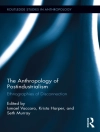Evaluation in Action: Interviews With Expert Evaluators is the first book to go behind the scenes of real evaluations to explore the issues faced—and the decisions made—by notable evaluators in the field. Drawing from the popular ‘Exemplars’ section in the American Journal of Evaluation (AJE), the book′s twelve interviews with evaluators illustrate a variety of evaluation practices in different settings and include commentary and analysis on what the interviews teach about evaluation practice.
Praise for Evaluation in Action
‘ Evaluation in Action: Interviews With Expert Evaluators is a ‘must’ read for those who want to know how evaluations really take place.’
—Marvin C. Alkin, University of California, Los Angeles
‘This book offers a rare opportunity to glimpse the assumptions, values, logic, and reasoning behind evaluator choices. It models the reflection required of good practice. The interviews are accessible and engaging, like being invited to a conversation over coffee—a tribute to the power of storytelling. They drew me in and made me want to join the discussion and ask even more questions. The section on cultural competence in evaluation is a particularly significant contribution to the knowledge base of our field.
—Karen Kirkhart, Syracuse University, former President of American Evaluation Association
‘This book is unique in the breadth of evaluation types and settings covered and the interview format provides a personal, in-depth picture of the evaluator′s thinking. I′m excited about using it with my students.’
—Katye M. Perry, Oklahoma State University, former Chair of the Topical Interest Group on Teaching of Evaluation
This book fills a major gap in evaluation literature. In addition to the cases, the introductory chapter is a masterful distillation of key issues in evaluation, while the last two chapters provide a concise analysis of the interaction of evaluation theory and practice.
—Leslie Cooksy, University of Delaware
‘A fresh and insightful glimpse into the deliberations and choices made by practicing evaluators. The questions asked of the evaluators are right on target and give students of evaluation, whether they are in the classroom or on the job, solid guidance on navigating around the dilemmas that arise when dealing with stakeholders and with sticky ethical challenges. This text fills a need in training evaluators not met by current textboooks.’
—Kathryn E. Newcomer, George Washington University
表中的内容
Preface
Chapter 1: Evaluation and Its Practice: Some Key Considerations and Choices
Part I: Traditional Evaluations with a Primary purpose of Judging Merit and Worth
Chapter 2: The Evaluation of GAIN: A Welfare-to-Work Program in California, An Interview with James A. Riccio
Chapter 3: Evaluation of the Natural Resources Leadership Program, 1995 through 1998, An Interview with Jennifer C. Greene
Chapter 4: The Evaluation of the Ft. Bragg and Stark County Systems of Care for Children and Adolescents, An Interview with Len Bickman
Part II: Evaluations with a Focus on Description
Chapter 5: The Evaluation of the Stanford Teacher Education Program (STEP), An Interview with David Fetterman
Chapter 6: The Evaluation of the Homeless Families Program, An Interview with Debra J. Rog
Chapter 7: The Council for School Performance: Performance Reports for Georgia Schools, An Interview with Gary T. Henry
Part III: Evaluations with an Emphasis on Program Planning and Organizational Development
Chapter 8: Evaluation of the Special Education Program at the Anoka-Hennepin School District, An Interview with Jean A. King
Chapter 9: Evaluation of the Work and Health Initiative with a Focus on Winning New Jobs, An Interview with Stewart I. Donaldson
Chapter 10: Developing an Evaluation System for the Corporate Education Development and Training (CEDT) Department at Sandia National Laboratories, An Interview with Hallie Preskill
Chapter 11: Evaluation of the Colorado Healthy Communities Initiative, An Interview with Ross Conner
Part IV: Evaluations Concerning Cultural Competence
Chapter 12: Evaluation of the Fun with Books Program, An Interview with Katrina Bledsoe
Chapter 13: Evaluation of Godfrey?s Children Center in Tanzania, An Interview with Allan Wallis and Victor Dukay
Part V: Analysis, Interpretations, and Conclusions
Chapter 14: Exemplars? Choices: What Do These Cases Tell Us About Practice?
Chapter 15: Analyzing the Practice of Evaluation: What Do these Cases Tell Us About Theory?
Appendix I: Other Categories for the Interviews
About the Authors
关于作者
Melvin M. Mark is professor of psychology at the Pennsylvania State University, where he also is Head of the Department of Psychology. He has served as President of the American Evaluation Association (AEA). He was Editor of the American Journal of Evaluation (and is now Editor Emeritus). A social psychologist, Dr. Mark has wide ranging interests related to the theory, methodology and practice of evaluation, as well as a general interest in the application of social psychology to evaluation and applied social research. Dr. Mark’s awards include the American Evaluation Association’s Lazarsfeld Award for Contributions to Evaluation Theory. He is author of more than 125 articles and chapters in books. Among his books are Evaluation: An integrated framework for understanding, guiding, and improving policies and programs and the co-edited volumes Social Science and Social Policy; SAGE Handbook of Evaluation; What Counts as Credible Evidence in Applied Research and Evaluation Practice; Evaluation in Action: Interviews with Expert Evaluators; and Social Psychology and Evaluation.












